‘Can you help him?’ A homeless Charlotte man and his dog find support from strangers.
As he swallowed his pride and experimented with begging for money, as he tried to find the parking garages with the darkest, warmest corners so he could steal some undisturbed rest, as he generally slid deeper into homelessness and hopelessness, Keith Foster considered what a few months earlier would have been unthinkable.
Maybe, he thought, as he fought back tears, it was time to give up his beloved standard poodle puppy, Tori.
Living on the streets, which the pair had been doing off and on since summer, was an ill fit for a dog. Not that it was Foster’s idea of a good time, either, but whereas he feared his hopes of magically finding a stable living situation for himself were fading, he knew he could find someone willing to take Tori and give him a home.
How did it come to this?, he wondered.
Things had been so good back in March, when he drove from upstate New York to Ohio with $400 in his pocket to buy Tori for himself as a 27th birthday gift. Life had been so full of promise for Foster in May, when he and Tori climbed aboard a Greyhound bus in Ogdensburg, New York, with the promise of a nice apartment and a steady job at Amazon waiting for him in Charlotte.
Once he got here, though, hope turned to despair with remarkable swiftness.
Within weeks, he and Tori were sleeping outside. A series of unfortunate events had left him and his dog homeless. For months, when he wasn’t at his job, he’d just roll his wheelchair around town looking for free food and fresh water, and for electrical outlets he could use to charge his phone.
“There’s always those people that say, ‘That’ll never be me. That’ll never be me,’” Foster says. “So once it actually was me, I was like, ‘Man. This is crazy.”
Then October brought a twist of fate that seemed even crazier:
On a whim, one woman made a desperate plea to help find Foster’s dog a home, and the appeal made its way to another woman who wound up spearheading an effort to get both Foster and Tori off the streets — and to keep them together.
‘Well, that’s not a problem’
Last spring, when she was working security at the Amazon CLT4 fulfillment center on Tuckasegee Road in west Charlotte, Tina Quizon became familiar with the sight of a young Black man who stood out because he was the only employee she knew of in a wheelchair — and because he was always smiling.
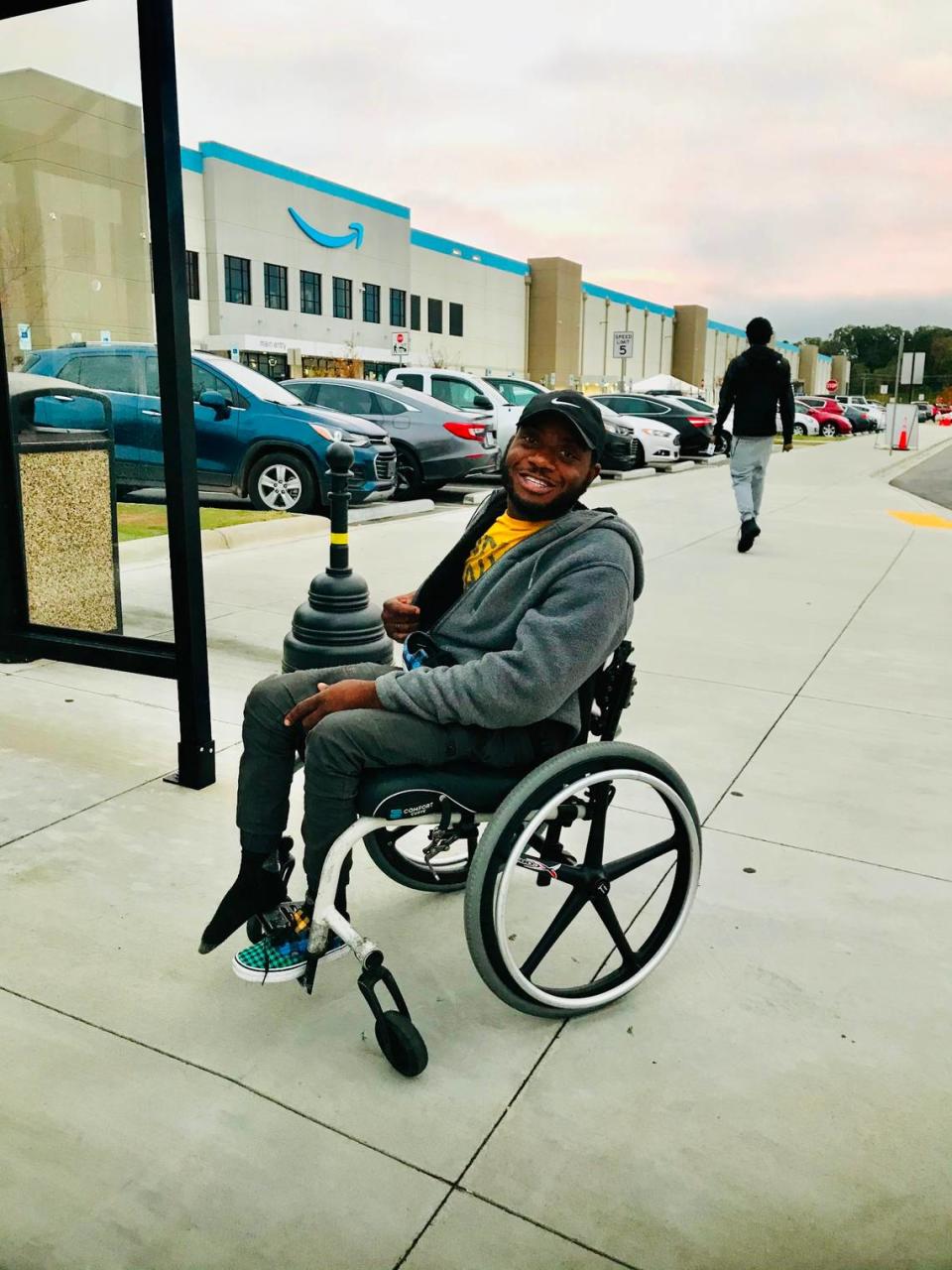
But on a rainy evening in September, when she spotted him uptown while she was working a weekend shift as a security guard for the Charlotte Convention Center, he wasn’t smiling; instead, he looked uncharacteristically miserable as he huddled under an overhang next to a portable space heater that he’d plugged into an outlet on the side of the building.
It was an awkward conversation at first.
Quizon was a little confused about what she was seeing, and wanted to know if he was OK. The young man — Keith Foster — was a little embarrassed to have run into someone he actually knew, and explained that while he was OK, he could definitely be better.
He was still employed by Amazon, he told her, but Foster was feeling sick, Amazon was requiring him to be tested for COVID-19, and he was having difficulty both figuring out where to go to get a test as well as solving the practical matter of actually getting there.
Quizon shrugged. “Well, that’s not a problem,” she told him. “I’ll take you.”
Foster was stunned. “Are you sure?” he asked.
“If that’s what you have to do so you maintain your job,” she replied, “of course.”
The next morning, as promised, she picked him up and took him to get tested. (The result was negative.) She also brought him some food and a sleeping bag.
But after that, Quizon wasn’t able to reach him on his phone again. It would be another few weeks before they saw each other again, and when they finally did, Foster explained to her that his phone had been stolen not long after she’d taken him for the test and that he had been frequently returning to the Convention Center in the hopes of bumping into her again.
She learned that he was indeed still homeless, still trying to get to work, still struggling to figure out what to do with his dog when he was there. Homeless shelters weren’t dog-friendly. Neither was his job working in the warehouse. He told her someone had been fostering Tori for him during the summer, but that she couldn’t always help.
Quizon shrugged again. “Well, that’s not a problem,” she said, again. “I’ll take him for you while you work.”
A big part of the reason Quizon reacted like this, she says, is because of her military background. She joined the Navy in 1978 and reached the rank of petty officer second class before her honorable discharge in 1982.
“I served my country. I still love serving the people of my country,” says Quizon, 60. “It’s very rewarding to me to be able to help others, and I think it’s just a necessary thing if we could all just maybe take off our blinders and have a little more empathy and compassion.”

On top of that, she was homeless herself from 2012 to 2016. So she knew something about the struggle. And as the two developed a friendship over the next week, she grew increasingly bolder about trying to get him some help.
Then one night, while they were sitting together outside of a Starbucks in uptown, two passersby stopped to admire and pet Tori when Quizon blurted out the plight of the dog — and of his owner.
Less than 24 hours later, a woman he’d never seen before in his life pulled up to a curb outside the Convention Center and told him: “Get in. I’m taking you to a hotel. It’s paid for, for the next two weeks. I’ll explain everything later.”
Looking for a fresh start
To say Keith Foster didn’t have an easy upbringing would be an understatement.
His father, he says, was a drug addict who was in and out of the picture throughout his childhood, and all Keith knows is what he’s been told: That when he was just 2 months old, one minute his father was holding him, the next minute he was on the ground with his spinal cord broken.
As it turned out, Keith would never be able to walk, making growing up in the rough-and-tumble neighborhood of Germantown, Pennsylvania, even more challenging.
Technically, he got his first taste of homelessness as a boy — his mom had to bring him and his three older siblings to a shelter “for a little while” — though he was young enough then and his mother was so calm about it, he says, that their situation didn’t register as dire. (He says they never had to sleep on the street.)
After his mother died unexpectedly when he was 17, Foster moved 350 miles north to Watertown, New York, and enrolled at Jefferson Community College, but never finished, he says, because he lacked the discipline and the focus.
From there he moved to Texas, where his sister had settled, but it didn’t fit him and he returned to upstate New York, this time even further north to the town of Ogdensburg (population: 11,000-ish, just across the St. Lawrence River from Ottawa, Canada), where he wound up working as a part-time cashier at the local Walmart and moving in with a boyfriend.
Then, after that relationship ended, in February, Foster decided it was time for another fresh start.
First, he got his dog Tori, in March.
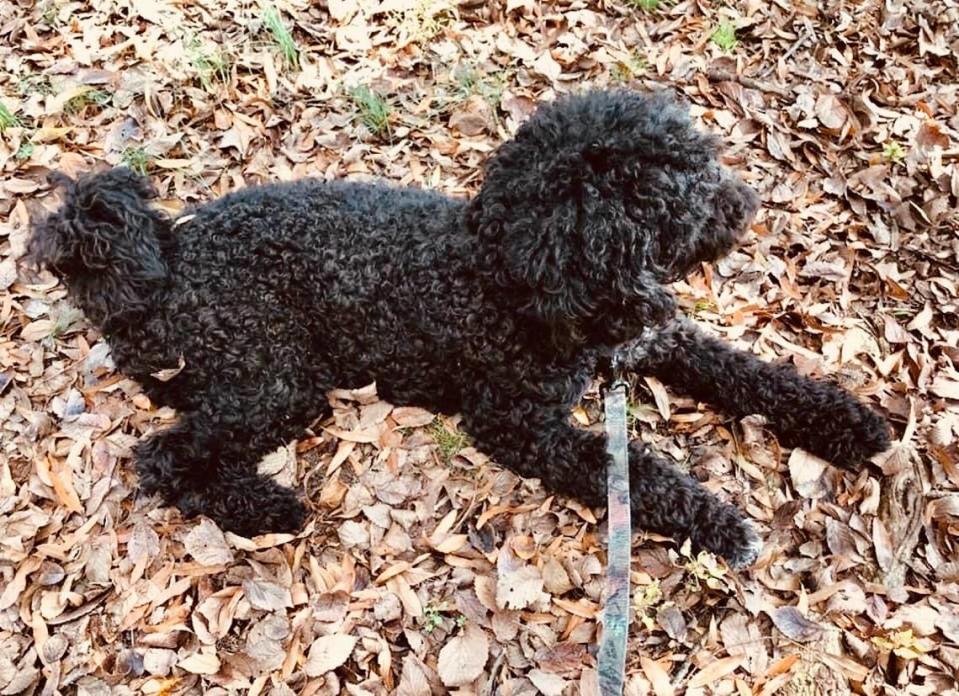
Soon after, when he heard Amazon was hiring thousands of workers for a new facility in Charlotte, and that the company was known for doling out rounds of bonuses worth hundreds of dollars, he applied and was hired without even being formally interviewed.
But within less than a week of getting off the bus with Tori in Charlotte, his luck began to sour.
Quick fall into homelessness
Foster had used a large chunk of his savings to prepay for a month-long stay in an Airbnb rental at the Cadence Music Factory Apartments on the edge of uptown. But he says he was asked to vacate after a bizarre sequence of events that saw him trying to help a homeless man who became disruptive and caused a scene that irked other residents.
As he waited for a refund, he moved into the cheapest hotel he could find that had a lenient pet policy.
Meanwhile, although he says he was told the job at Amazon would be part-time for the first month and then he’d move to full-time, he says he remained part-time for several weeks longer than anticipated.
To make matters even more difficult, he’d planned to rely on public transportation, but the city bus schedule and bus-stop locations weren’t very compatible with his situation. In order to reliably get to work on time, Foster often would need to call Uber or Lyft (whichever was cheaper) — causing him to hemorrhage money even more quickly.
He had no support system in Charlotte. No parents who could help. Two of his siblings were able to send him about $500 each, but he says he didn’t want to ask for more after that.
By summer, without anywhere else to turn, he had resorted to a pattern of sleeping outside behind the hotel when he ran out of money, then checking back in for as many nights as he could afford after he got paid.
Amazon elevated him to full-time in July, he says, but by then Foster had no safety net at all and it seemed impossible to imagine he’d be able to amass the thousands of dollars he would need to secure even the most basic apartment in a city with such a dearth of affordable-housing options. (Also, he didn’t qualify for government assistance due to the fact that he was employed full-time.)
Remember, too, that he was living like this while trying to provide for Tori.
He had some relief: He says the woman who managed the hotel he was sleeping behind became aware of his situation and kindly offered to foster Tori temporarily, allowing him to get a bed at a shelter for about three weeks during the summer. But at one point when she had to give the dog back to him, he was turned away from the shelter when he tried to sneak Tori in.
It was becoming untenable. Although he absolutely preferred having Tori full-time, he couldn’t bring him to work; he actually tried it once, and his bosses nixed it. So if he couldn’t get help from the hotel manager when he and Tori were doing a stint out on the street, he had no other choice but to call and say he couldn’t make it in.
And he did like going to work.
Because, he says, as someone who’s homeless, “When you don’t have to go to work you’re just like, ‘What am I gonna do all day?’ ‘Is it gonna rain today?’ ‘Is it gonna be too hot today?’ ‘Where am I gonna get water?’ Then on the days that you do have to go to work, you’re like, OK, you’re at work for a few hours, you got a roof over your head, you got people to talk to.
“But 5:30 comes around and everybody says, ‘Hey, see you tomorrow!’ And you’re thinking to yourself, Yeah, I’ll see you tomorrow, but tonight is gonna be rough.”
As summer turned to fall, he also began gravitating toward uptown more, which had pros and cons.
On the one hand, for instance, he was more easily preyed upon, and as he slept, others would steal stuff from him, including items of clothing and multiple cellphones. On the other, free-meal lines for the homeless were more accessible, and it was easier to find buildings that gave off heat, or had public Wi-Fi.
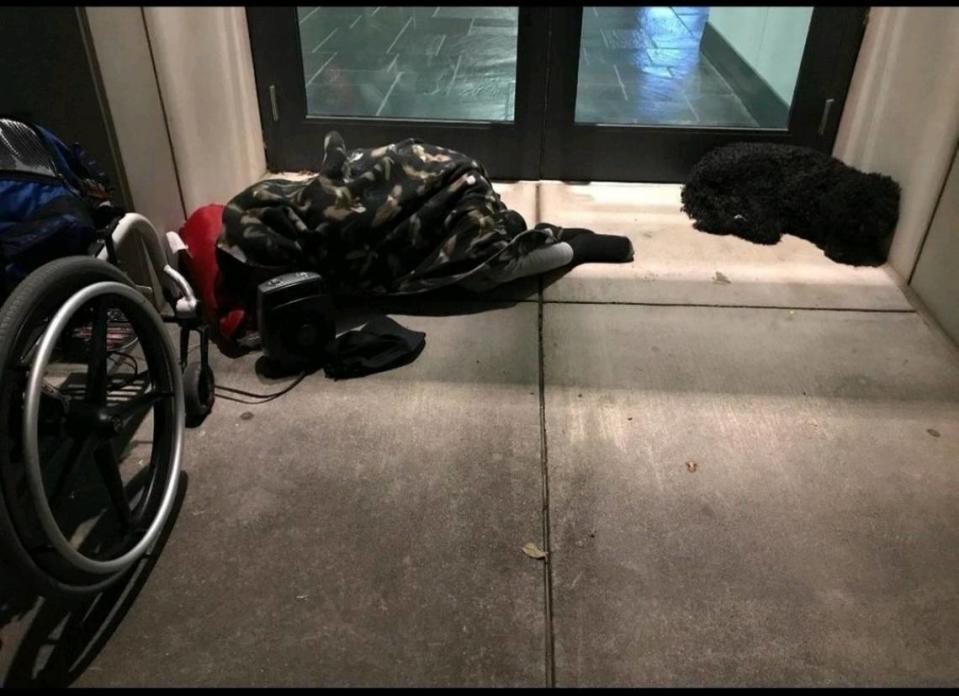
Being uptown was also fortuitous, though, because if he hadn’t been there, he might never have bumped into Tina Quizon at the Convention Center — and if he hadn’t bumped into Quizon, he might never have met Kymm McLean.
Outpouring of support
McLean makes her living as a professional makeup artist and hair stylist, but she’s also made a name for herself on Facebook as a champion of the dog-rescue movement: A fair percentage of her posts highlight animals that are in need of good homes.
She’s a magnet for people looking to help dogs in need, and so it wasn’t at all unusual when she got a random message about one on the night of Oct. 28.
“This woman said, ‘Hey, I just left Starbucks and there is a guy outside Starbucks. He’s homeless, he’s in a wheelchair, he has a dog, and the dog needs fostering so that he can work,’” McLean recalls. “She’s like, ‘There’s a nice lady with him who does foster the dog sometimes, but she’s not allowed to have dogs in her apartment. Can you help him?’”
Within minutes, McLean had texted the nice lady — Quizon — to get all of the information, and Quizon had replied with photos of the dog — Tori — and of his owner — Foster, along with lots of details about their plight. She composed a post that wound up being as much about the man as it was about the man’s best friend, and went to bed.
When she woke up the next morning ...
“It had been shared like — I don’t know — 375 times. I had a ton of messages and like 400 comments,” she says. “Everybody was wanting to know where they could send money.”
McLean figured maybe there’d be enough donations to get him a few meals, maybe a tent and a sleeping bag, or at best a hotel room for a handful of nights. Instead, she says, “the money just came in and came in and came in and came in.” By midday, people had sent McLean nearly $3,500.
She also heard from Bethany McDonald — director of the Charlotte-based Hearts Beat As One Foundation, which focuses on animal welfare and homeless outreach — who offered to coordinate putting him in a pet-friendly hotel with inexpensive rates.
A few hours later, at the exact moment Quizon was dropping off Foster at the Convention Center (she’d just taken him for another meal), McDonald pulled up in her car with a hotel room key and McLean pulled up in her minivan and told Foster to get in.
Foster, who had planned to sleep on the pavement that night, was stunned. He had no idea what had been going on, and no idea who McLean was. But Quizon nodded her head.
“Trust her,” she told him.
Upon arriving at the La Quinta Inn & Suites at South Tryon Street and Yorkmont Road, McLean just said, “Go in. I’ve gotta go to work. Just go get settled, and I’ll come back and explain everything tomorrow.”
That night, and for 13 more nights after that, he slept in a hotel bed with Tori curled up beside him.
While he was there, two significant things happened.
The first is that Amazon terminated Foster both for repeated lateness (due to transportation issues) and for not showing up at all multiple times (due to having no one to watch Tori). But while under other circumstances losing his job might have been devastating, it’s actually being viewed as a blessing.
That’s because the other big development is this: McLean found a solid temporary housing solution for Foster, using the growing pile of donations to pre-pay for three months at Independence Place, an apartment complex on Independence Boulevard that offers short-term leases — and that is dog-friendly.
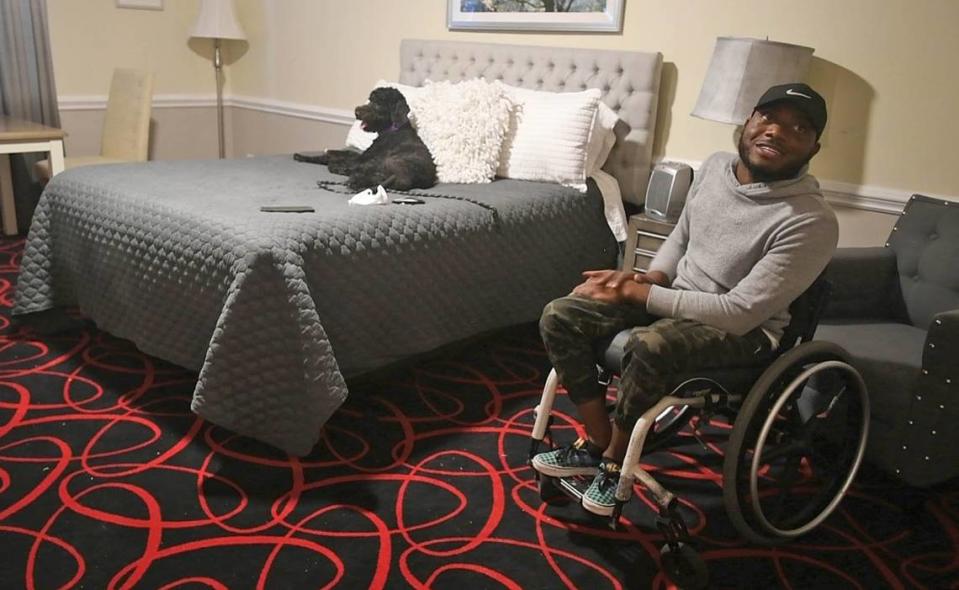
So through at least mid-February, instead of the hassle of getting from the east side to the west side for work every day, Foster has a comfortable home base from which he can take his time trying to find a job better-suited to his situation, ideally something that can be done remotely, like working in customer support by phone for a company.
And it’s not just time that he has on his side now, either.
Hope for the future
Keith Foster is sitting in his chair in the courtyard at Independence Place, and he smiles as he looks over at Tori sunning himself in the grass.
The dog looks practically like he’s ready for a show, having just gotten a free grooming from Pets In The City, a Charlotte pet supply store that donated the service after hearing about their story through McLean’s network.
McLean, who is seated next to Foster, is smiling, too, as she explains how a staffer at Heart Beats As One offered to redo his resume. She got it back from them the night before, she says, and “it looks fantastic.” Later in the day, she’ll help him send it off to prospective employers.
Quizon has been less involved with Foster of late only because she had to leave the area earlier this month to deal with a family emergency. But from afar she continues to marvel at what has happened since she made her impassioned appeal to the two women who stopped to pet Tori at Starbucks.
“It’s just amazing,” she says. “At a time when everybody in the country is so divided, here is this enormous, beautiful, unified effort that I think everybody should be really proud of. It wasn’t just one person, it was everybody just giving a little or doing a little.”
Meanwhile, Foster and McLean have become good friends, fast, having been in touch or seen each other every day since she came back to the hotel and explained what had happened and why she was doing this.
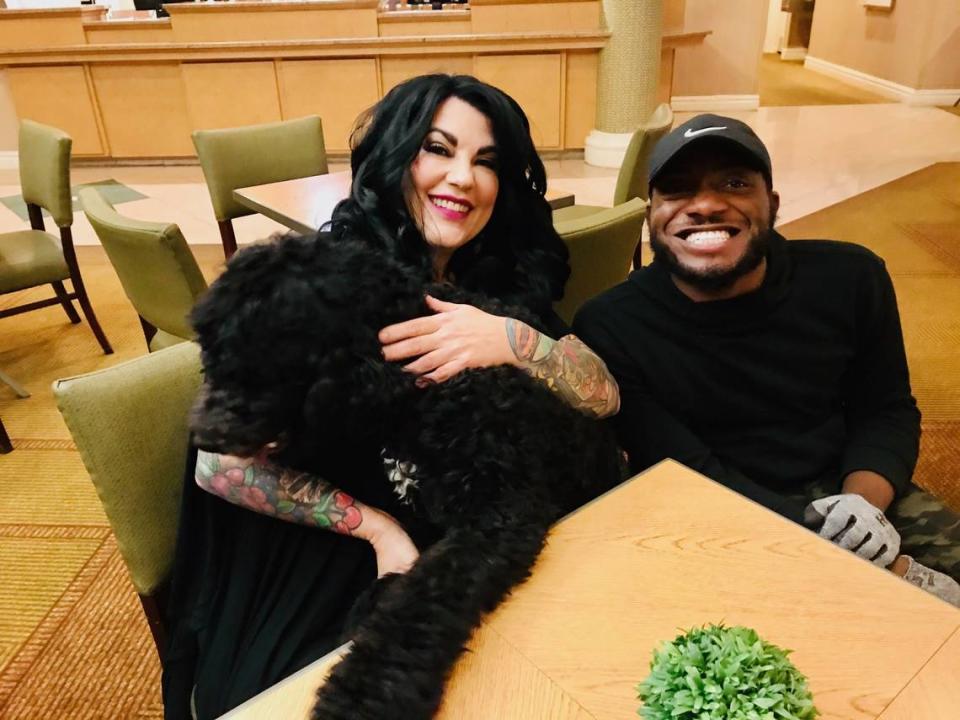
What she said to him is that she’d been there herself — that when she was a teenager, she lived on the streets of Charlotte for years after leaving home to escape domestic violence, and that one of the keys to her being able to eventually get off of them was the kindness of strangers.
And one of the lessons she hopes people will take from this is the value of the kindness of strangers, and the ease with which it can be manifested.
“There’s always going to be an environment where animals or humans suffer,” McLean says. “So if you had an opportunity, why would you not take some time to make a difference in someone’s life? Because anybody can suddenly find themselves in that position.”
Foster nods and smiles at her for a couple of seconds. But he admits that he’s also now feeling pressure. Pressure to get another job, pressure to hold onto it, pressure to attain financial stability, pressure to keep a good roof over his head — and over Tori’s head, too.
“What happens after the three months?” he has been constantly wondering. “So many people have been generous to get me out of this situation. ... Are they gonna regret it? Will they be like, ‘Did we help the wrong guy?’ So I just want to make sure that I can keep it going after this.”
Tori comes over and nudges at Foster, who turns his head and looks down at his pup as a soft smile forms on his face.
“I don’t know,” Foster says. “Why me? That’s all I can say. For both of the situations,” he says, meaning his previous misfortune and his current great luck. “I still don’t believe it to this day. I’m just like, ‘Where’d all these people come from?’ It kind of is a miracle.”
He scratches his freshly groomed dog behind the ears as he sits next to a woman who changed his life in the shadow of an apartment he lives in thanks to a collection of Good Samaritans he’ll probably never meet.
“I don’t know. I just —” and here he pauses, that soft smile blossoming into a grin as he glances around him.
Finally: “I’m just thankful.”
(Kymm McLean has set up a new GoFundMe to provide continued support to Keith Foster. It can be found here: www.gofundme.com/f/keith-amp-tori-story.)

